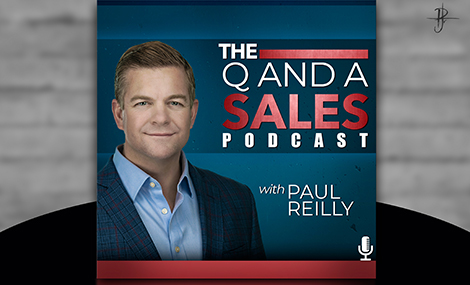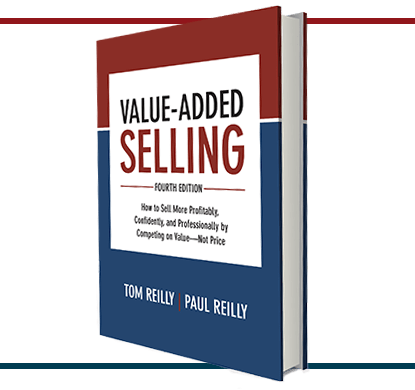On this episode, Paul shares three great tips for new salespeople.
Show Notes:
“Be prepared to play the….”
Get to know your industry and become a student of your profession.
Problems create opportunities for salespeople.
Understand and communicate all the ways your company, your product, and you bring value to the customer.
Click here to purchase the latest edition of Value-Added Selling!
Thanks to our production team at The Creative Impostor Studios!
Click here to book a complimentary consultation with Strategist and Producer, Andrea Klunder, to find out how to launch, produce, and grow your company’s podcast.
***
Thank you for tuning in. Our show is updated weekly with the questions you ask. So, please go to the home page to ask the question that you want answered.
Be sure to follow our show in your favorite podcast app and share this episode with a colleague or friend.
And most importantly, you know what to do…make it a big day.
As a new salesperson, how do I encourage buyers to work with me?
(Transcribed from podcast)
Today, we have a question coming from the website. So this is a reminder to each and every one of you. Make sure you visit TheQandASalesPodcast.com. While you’re there, you can ask me a question, I will turn it into a future show. This is proof positive.
I’m going to read the question from Zach, and then I’m going to paraphrase it a little bit for you. So here’s what Zach had to say. “I am new to sales at a small company. When making cold calls, what attributes can I provide to a prospect that will encourage the buyer to be motivated to work with me over our competitors that have more experience? Do you have any tips or resources for lead generation?”
So that, Zach, is kind of a loaded question. I’m going to summarize that into a more formal question. That question is, “How do I encourage buyers to work with me, even if I’m a new seller—maybe I’m not as experienced as some of our competitors?” So that is the question we are going to answer today here on the show. Now Zach also is selling in the welding supply, medical gas industry in the Atlanta area. So that’s obviously a big market. It’s a competitive industry, so I’m guessing you have a lot of tough competitors as well. With that being said, guys, we’re going to answer that question.
Before we do though, a quick shout-out to our sponsor. Andrea, over at The Creative Impostor Studios does a wonderful job on the podcast. Podcasting is such a great way to connect with your audience, to build a brand, to just get your name out there. If you’ve thought of starting a podcast—maybe you and your buddies have a couple of ideas for a podcast—hey, reach out to Andrea and her team. She can help you out. The Creative Impostor Studios is your go-to resource. We’re going to have a link over to her website on this episode’s webpage, so check it out.
Also pick up your latest edition of Value-Added Selling. It’s now in the fourth edition, and I just received word from our editor that it is now available again on Audible. It was on Audible for a little while, it was off, now it’s back on. May 1st it’s going to be back on there so you can download your copy of Value-Added Selling, or you can order a hard copy, whatever you prefer.
With that being said, let’s get back to that question: How do I encourage the buyer to work with me as a new seller? Well, Zach, I’m going to give you a few tips and ideas that are going to help you. You’re going to need to play the long game here because you need to build up your industry knowledge, your expertise—that’s going to be part of it. One of the best ways we can improve our knowledgeable expertise is partnering with our existing customers. So Zach, that’s the one thing I’d recommend for you right away is reach out to some of your best customers. These are going to be your established customers in that arena—you’re selling that welding gas, medical gas. Reach out to those customers, the people using your product, installing your product, buying your product.
Ask them if you can spend some time with them in the field just learning about their day-to-day operations: what they do, how they do it, how they use your product and services. And what you’re going to do is, you’re going to fully immerse yourself in the customer’s business. This is critical because it gives you a front-row seat into how your customers are managing their business: what they’re doing, how they do it. You are going to gain a wealth of knowledge as you immerse yourself in their business. So partner with your sales manager, business owner, whoever has the relationship with those customers. Work with them and say, “Hey, we need to get Zach out here to shadow you guys just to learn.” And I think you’re going to find that customers welcome this with open arms.
I know right now there’s pandemic—COVID, all that. I wouldn’t let that stop you from asking. Make sure you ask and at least get that request out there, so when things do start to open up as they are, you can be first in line there to spend some time with your customer.
The second thing I would do, Zach, identify the most common problems customers are having in your industry. This is critical. Problems create opportunities for salespeople. So we need to understand, what are some of the common challenges our customers are facing? And how we do that is by talking to our salespeople that we’re working with now. Reach out to your experienced salespeople. The folks that have been in their territory for a long time, they have a lot of industry experience. Have a roundtable discussion about the common problems customers have. Maybe it’s shortage of supply, maybe it’s serviceability, maybe it’s safety concerns. Whatever it may be, we’ve got to figure out what those problems are because those problems will open up the doors.
Here’s why I say that. We did a research project. I’ve referenced it a couple of times on the show already, but it’s worth mentioning again. We asked a group of decision makers why they would be willing to meet with salespeople, and the number-one response was, “It appears the salesperson can solve a business problem that I’m currently experiencing.” That is why we identify problems in our messaging. If you can begin your message, that request—the meeting request, rather—by identifying a problem, you’re more likely to get that meeting. I would work with your sales team, work with your sales manager, whoever it may be, and just identify the common problems your customers are having.
Better yet, when you are talking to your customer, the first tip was to get out there with the customer, get to know them, immerse yourself in the business. When you’re interacting with them, ask your customer, “Hey, what are some common problems you face when it comes to the medical gas supply industry or welding supply?” All that good stuff Just ask them what their problems are, and you’re going to find that many of your prospects that you’re trying to reach out to are going to have similar problems. That’s going to create a window of opportunity for you.
And the third tip: we not only need to know our industry, but we need to know our company’s value. Your company’s value, the product value, and the value you bring as a salesperson are collectively called the three dimensions of value. You must have an in-depth understanding of all the ways you bring value within those three dimensions. So I’d recommend conducting a value audit. A value audit is where you’re going to get together with your either sales team, your operations team, sales manager, or maybe your whole company. You mentioned a small company, maybe everyone gets together and you guys conduct a value audit.
A value audit is pretty simple. You’ve got to look at all the ways your company brings value. So think about the company value added you offer. That could be flexibility, it could be longevity, your reputation. Any number of things, technical support, that could be part of your company value added. You want to identify all those ways you bring value.
Second thing is you want to look at the product and services that you offer, the value there, and you can talk about your ability to customize, the quality of the product that you’re offering. You can talk about inventory levels. That falls down there with product and all that piece. So think about all the value that you bring from a product standpoint. Then you want to think about you as the salesperson—the value that you personally bring. It could be your expertise; it could be your ability to follow through and follow up; it could be your integrity. There’s a number of value-added extras that you bring.
Now, we’re not going through this value audit so that you can show up and just throw up 30, 40, 50 value-added extras that you offer. No, that’s, not why we’re doing it. The reason you’re doing this is just so you understand all the ways you bring value. Because if you’re a new salesperson, you have yet to really understand all the ways your company, the products, and you as the salesperson, bring value. So it’s clear we’ve got to understand that. And once we have a clear understanding of that, it becomes easier for us to go out there and communicate which value-added extras are going to be important and meaningful to the customer. Because remember, the customer defines value and it’s their definition of value that really matters. So that’s why we do that value audit.
Not only that, but here’s a bonus tip. Once you identify the common problems your customer experiences, then identify some of the value-added extras that will help solve that problem. So you think about that—how all this kind of works together. Get to know our customers. We get to understand the problems they face. And then by going through a value audit, we understand how we can solve that problem.
Alright, Zach. Well, that is three tips for you. I hope that helps, buddy. Best of luck out there.
Make it a big day.


